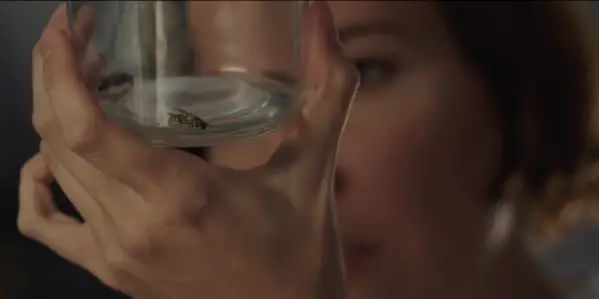The two-actor movie is a dicey proposition. Opportunities to come off awkward and limited leer around every corner. The most successful exemplars — My Dinner With Andre, Old Joy, Before Sunset — hang on strong performances that allow the central relationship to feel lived in and their world to feel like a real place. They Remain, a new two-actor horror film from Philip Gelatt, is made from the same recipe, but seems to have forgotten some of the ingredients.
The film, adapted from a short story by Laird Barron, is about two young scientists, Keith (William Jackson Harper) and Jessica (Rebecca Henderson), who set up an impromptu base in a wooded area to investigate strange animalistic phenomena. Over time, the two fill us in on the region’s odd history. It’s formerly the site of a Manson Family-like cult that became extinct following their mass suicide. To illustrate it, Gelatt gives us the occasional flashback, which play like Rescue 911 dramatizations.
Other than that, it feels like we spend most of the movie’s runtime watching Keith either frustrated with his mysteriously malfunctioning computer or wandering around in the woods. Every once in a while Keith and Jessica have a tense conversation that doesn’t elucidate much — it doesn’t help that the chemistry between the duo doesn’t exactly runneth over. And then the film’s third act turns psycho-sexual and overly droney.
Overwrought, Under Developed
Gelatt is comfortable being both glacial and ambiguous. Approximately 70 minutes go by without much of anything really happening. This isn’t necessarily a criticism, but when something finally does happen, it hardly feels like a payoff for the patient viewer. Ultimately, the film feels unsure of what it wants to say. But its real problem is that, whatever it wants to say, it doesn’t know how to get us engaged enough to really consider it.

While many of the images are sharp and within tightly composed frames, the cinematography is obsessed with a few gimmicks — primarily, dramatically racking focus. It becomes distractingly overused, and not necessarily as a narrative tool but for flair. Otherwise, Gelatt relies on performative uses of montage and drones to sublimate ambience, while neglecting any useful sort of world building.
Standing in the Shadows
Unfortunately, They Remain has a premise reminiscent of more accomplished films. John Carpenter’s The Thing comes to mind — another film about scientists sent to a secluded area to investigate suspicious phenomena. It’s also hard not to think about last year’s It Comes At Night — a similarly contained movie about the threat of the unknown, which may or may not reside in the nearby woods. And even Annihilation, which shares a release date in close proximity to They Remain, is hard not to view comparatively. It’s also about a group of mostly scientists exploring unfamiliar terrain.
I wouldn’t consider the latter examples great by any stretch, but all three of these films are able to immediately establish a world with rules, as well as interpersonal dynamics at play within it. Those two more recent films are even able to remain willfully vague, much like They Remain, while exploring parameters that we, as the viewers, are interested to find out more about. Gelatt’s film fails on this level. Rather than being eager to explore this world, I was wondering what the film thought was so compelling about it.
They Remain: A Dark Past
As I mentioned, the film labors over the dark past of its setting — the Manson-esque cult. If I’m being generous, I think the film’s preoccupation with this aspect, mixed with its current strange happenings, is an attempt to comment on how America’s troubled past lingers in our contemporary fabric — how history finds reverberations in our present, a la The Shining.
There’s also the potential to read something into this sterile intervention of nature. The scientists’ makeshift lab/domicile is dropped into a mysterious lot of nature, intending to figure out its mysteries, only to become embedded in its mystique. However, if there’s anything in this text that properly lends itself to these readings, Gelatt never cogently puts the pieces together, nor persuades us why we should care to figure it out.
I will say, we’re left with a humdinger of an ending. The final sequence is not only surprisingly satisfying, but offers us an uncomfortable moment that resembles closure, while avoiding an overly clean denouement. Unfortunately, the effectiveness of this ending highlights the weakness that preceded it. A more optimistic takeaway might highlight this moment as possible evidence that Gelatt has something more fulfilling to offer us in his future.
Do you think They Remain is better than I give it credit for? Let me know.
They Remain opens theatrically in New York on March 2 and Los Angeles on March 9, 2018.
Does content like this matter to you?
Become a Member and support film journalism. Unlock access to all of Film Inquiry`s great articles. Join a community of like-minded readers who are passionate about cinema - get access to our private members Network, give back to independent filmmakers, and more.